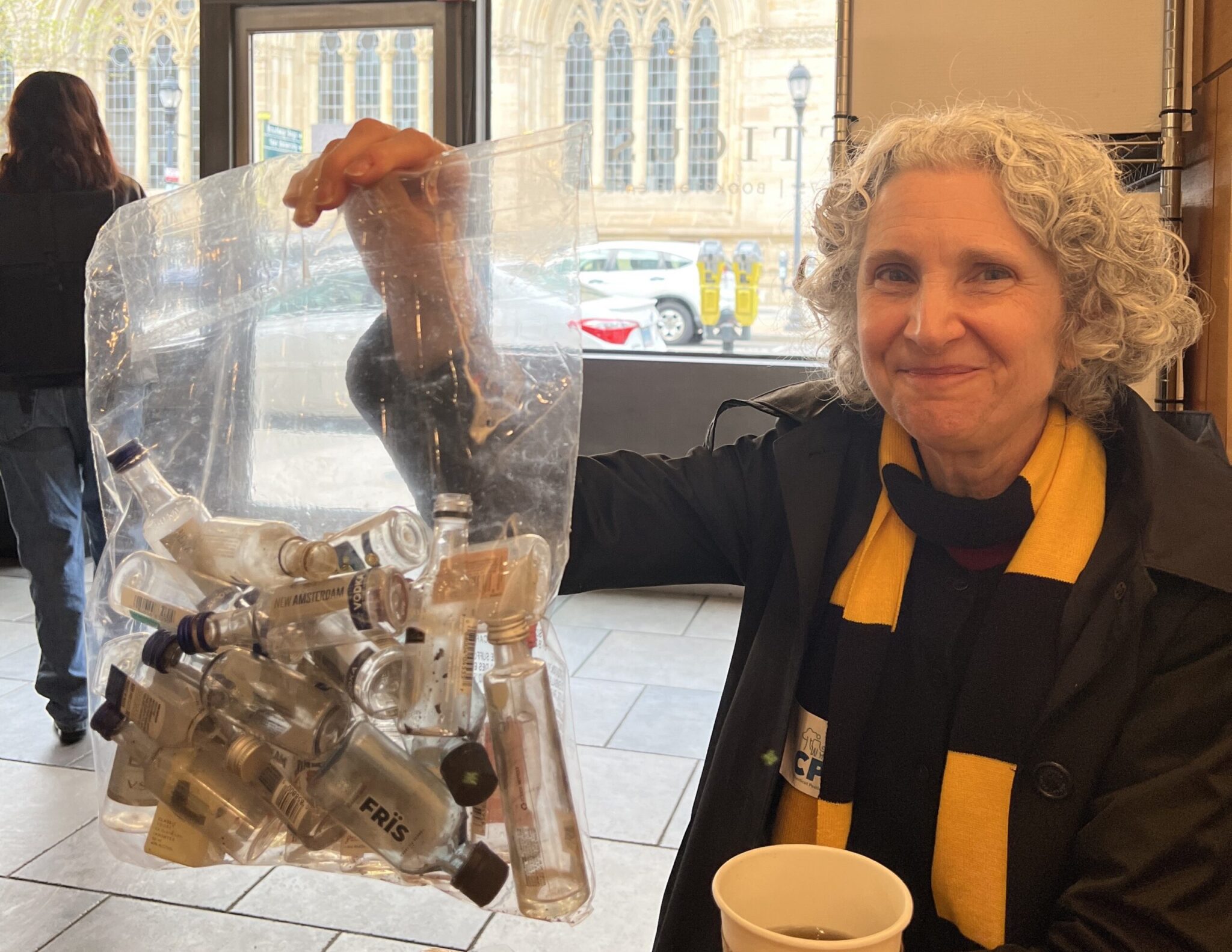Meet Laura Cahn, concerned mother turned champion of environmental issues
Laura Cahn is the chairwoman of New Haven’s Environmental Advisory Council. She began her environmental work because she wanted to set an example for her daughter.

Lily Belle Poling, Contributing Photographer
Frustrated with Yale spraying pesticides on the fields behind her home in Westville, Laura Cahn spearheaded the movement to reboot the previously inactive Environmental Advisory Council, or EAC.
“The air stank of poison,” Cahn said about the day she came home and first noticed the pesticides being used in her neighborhood.
She was concerned about letting her daughter go outside. She was wary of hosting a party she had previously planned.
Cahn’s neighbor, Jeanne Dubino, told the News that she is scared to walk her dogs on the sidewalk in Westville because she has no way of determining what is being sprayed in her neighborhood — both by her neighbors and by Yale on the nearby athletic fields.
After first noticing the pesticide usage, Cahn worked with other environmental advocates in the Elm City for about a year to advocate for the reinstatement of the EAC, which had remained inactive for decades.
Under former Mayor Toni Harp’s administration, Cahn sought to facilitate consistent conversations about environmental issues, and the EAC could ensure these conversations would be heard by executives and legislators with the power to affect change.
With the help of Alder Sal DeCola — who chaired the City Services and Environmental Policy Committee at the time — the EAC was reactivated in 2014. Cahn was immediately named chairwoman.
“Laura is a committed environmental advocate and champion for New Haven residents and the city at large. Meetings [with Cahn] are incredibly substantive and cover a wide variety of important and pressing environmental issues that impact the day-to-day lives of our residents as well as the long-term direction of our city,” Elicker wrote to the News. “It was an easy decision to reappoint her to the EAC, and we’re fortunate to have her serving in this role.”
Since her original appointment, Cahn has persistently advocated for more transparency surrounding pesticide use, all the way up to the state level. In an interview with the News, DeCola emphasized how energetic Cahn is when advocating for the entire state.
Before interviewing with the News, Cahn spent her morning talking with the Connecticut Department of Energy and Environmental Protection, insisting that they make pesticide records available online. As of right now, one must request individual hard copies of pesticide records. When she spoke with the News, Cahn brought a stack of records as tall as her cup of mint tea to Atticus Bookstore Cafe — a stack that she said was only a small portion of her entire collection.
Since its reactivation, the EAC has successfully advocated for legislation that discourages the use of pesticides, lobbied for the creation of a city office dedicated to climate change and sustainability, worked to update light ordinances and encouraged bans of styrofoam and plastic bags — among numerous other efforts that promote environmental protection and sustainability.
“I decided I needed to help because I needed to set an example for my daughter,” Cahn said. “It’s not that I wanted to be the chair of this, it’s that I wanted to do the work. I had no idea it would go on this long and become this involved.”
In middle school, Cahn recalls spending time learning about the importance of sorting recyclable materials. But, as a college student, she wanted to work as a talent agent to represent screenwriters. She worked at a talent agency in Manhattan for 10 years, which she described as “stressful but fun,” before following her husband to New Haven.
As a Westville resident, Cahn began volunteering in her community and became an active member of her daughter’s elementary school’s Parent-Teacher Organization. She told the News that her time in New Haven has been guided by her desire to help and “to make things better.”
Jeanne Dubino, one of Cahn’s neighbors who has known her since 2009, commends her for the work she’s done for the community. According to Dubino, Cahn thoroughly researches every issue she speaks on and is careful to not exaggerate the issues she presents. What sets her apart from other activists is her ability to work with lawmakers to get things done, Dubino said.
“She’s just tireless and she works with so many different issues,” Dubino said. “She really is kept awake at night with all the different environmental problems that are out there.”
Whenever Cahn is outside, she makes sure to pick up miniature liquor bottles off the side of the road. She toted a bag full of these “nips” to Atticus when she interviewed with the News — a bag that she had collected entirely from a walk she took the previous day. She has testified in front of the state legislature on behalf of a bill that seeks to allow cities to ban the sale of alcohol bottles smaller than 50 milliliters, which significantly contribute to ground and water pollution and cannot be recycled.
Steve Winter, the director of the Office of Climate and Sustainability that Cahn’s EAC advocated to create, applauded her for spearheading a wide range of environmental initiatives.
“Whenever there is an important issue at the local, state or national level, whether it is related to pesticides, air pollution, water pollution, materials management, climate change, or other issues, Laura [Cahn] is always there to speak up for what’s right for our environment,” Winter wrote in an email to the News.
He also noted some of Cahn’s other contributions to New Haven, including her calls to attention about the lack of progress being made in the remediation of English Station, advocacy for restricting emissions from petroleum tanks near the port and her criticism of the Murphy Road recycling facility’s expansion.
The next EAC meeting is scheduled for May 1, 2024.







